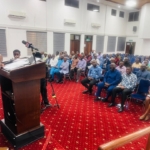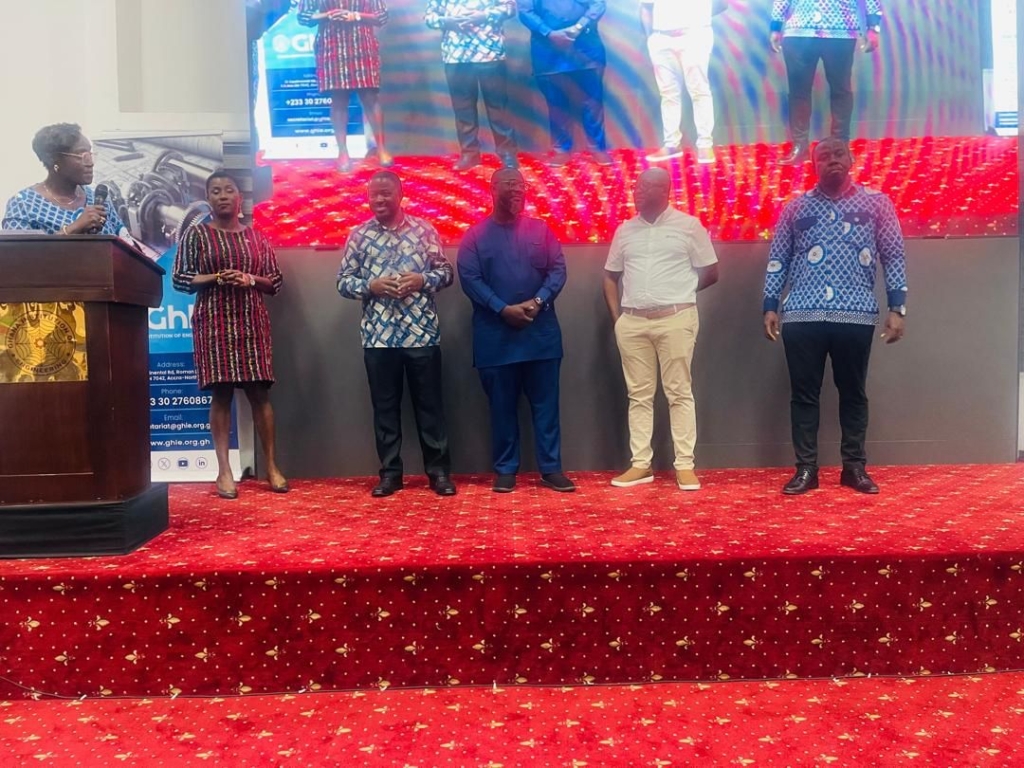
The members of the Ghana Institution of Engineering (GhIE), has been charged to find its rightful seat at the stage of policy formulation tables of Government and lead the developmental agenda of the nation.
The call was made by Senyo Hosi, Founder and Executive Chairman of Kleeve and Tove Limited, when he delivered a thought-provoking address as the Keynote Speaker, at the GhIE Annual Ethics Lecture series, at the Engineering Centre, Roman Ridge, Accra, on Thursday, October 30, 2025.
Speaking on the theme: “Feeding Ghana Responsibly: The Ethical Role of Engineers,” the Public Policy Advocate, Mr. Senyo Hosi expressed dissatisfaction that over 45% of our population, about 15 million of our own people seem to be experiencing food insecurity.
He said, with relatively higher arable land per hectare per capita, it is unacceptable and does not auger well for our populace to be experiencing food insecurity.
“About 8 years ago, we had about 11 million people experiencing food insecurity, fast forward, we now have about 40% increase to about 15 million people experiencing food insecurity. That’s troubling!” Mr. Senyo Hosi explained.
He therefore called on engineers in the country to get involved in the Ministry of Agriculture’s currently launched program dubbed, Feed Ghana Programme (FGP), because Agriculture and Engineering, and current modern practice are intertwined. The Feed Ghana Programme is an integrated agriculture acceleration program aimed at boosting food production, feeding the nation, providing raw materials for industry, and creating jobs.

The Chairman of the function, Eric Opoku, Minister for Food and Agriculture, in a message read on his behalf by the Chief Technical Advisor to the Minister, and former MP for Kintampo North, Kwasi Etu-Bonde, said, “Food security is not just about increasing yields or expanding production. It is about ensuring that the systems, technologies, and infrastructure that support agriculture are efficient, safe and environmentally responsible. And this is where the engineering profession plays such a crucial role”.
“From the design of irrigation networks and post-harvest storage systems to the development of agro-processing facilities and rural infrastructure, engineers are indispensable partners in building the foundation of a resilient and productive food system. But beyond technical expertise, this work demands ethical mindfulness – the commitment to make decisions that safeguard the environment, protect public health, and advance social equity,” he added.
The Agric Minister emphasised that to feed Ghana responsibly is, therefore, not only a scientific or economic challenge but is an ethical one. “It requires engineers, along with policymakers, farmers and industry players, to align innovation with responsibility, and progress with sustainability”.
In her welcome address, the Chair, Professional Practice and Ethics Committee, Annual Ethics Lecture 2025, of the GhIE, Ing Yaa Okudzeto, said, this year’s theme, calls on engineers to consider how their work intersects with one of the most essential pillars of national development – food security.
She explained that, as engineers, whether in agriculture, water management, energy, transportation, or advanced technology, their decisions influence how sustainably and equitably Ghana can feed her people.
The Vice-President of GhIE, Ing. Dr. Patrick Bekoe, who stood in for the President of GhIE, Ing. Ludwig Annang Hesse, said in addition to the government’s 24-Hour Economy initiative, is the Feed Ghana Programme launched in April 2025. The government has also introduced the Presidential Initiative in Agriculture and Agribusiness (PIAA) to advance the modernisation of the agricultural sector.
He added that the success of these visionary programmes rest heavily on the ingenuity and dedication of Ghanaian engineering professionals.
Ing. Dr. Bekoe stated that across the country, engineering practitioners design and maintain agricultural mechanisation systems; develop agro-infrastructure and climate-resilient structures; improve rural access and electrification; advancement of renewable energy and smart-farming technologies; promote sustainable land and water management; and optimise industrial processes and supply chains. Yet, as essential as these contributions are, they will yield their full benefit only when carried out with ethical conviction.
The Guest of honor, Benjamin Gyan-Kesse, Executive Director, Kosmos Innovation Center, reminded engineers that as long as everyone eats, the need to promote ethical engineering solutions to advance the value chain of agriculture is vital.
He emphasised the importance of engineering solutions through collaborative effort and supportive measures to improve food security in Ghana”.
Present at the programme included: Ing. Sophia Tijani, the President-Elect of GhIE; Ing. Kwabena Bempong, the Immediate Past President of GhIE; Council members of GhI;, Past Presidents of GhIE; Ing. Juliet Gbormittah, Director of Membership Services of GhIE; the Registrar of the Engineering Council, Ing. Isaac Bedu and the general public.